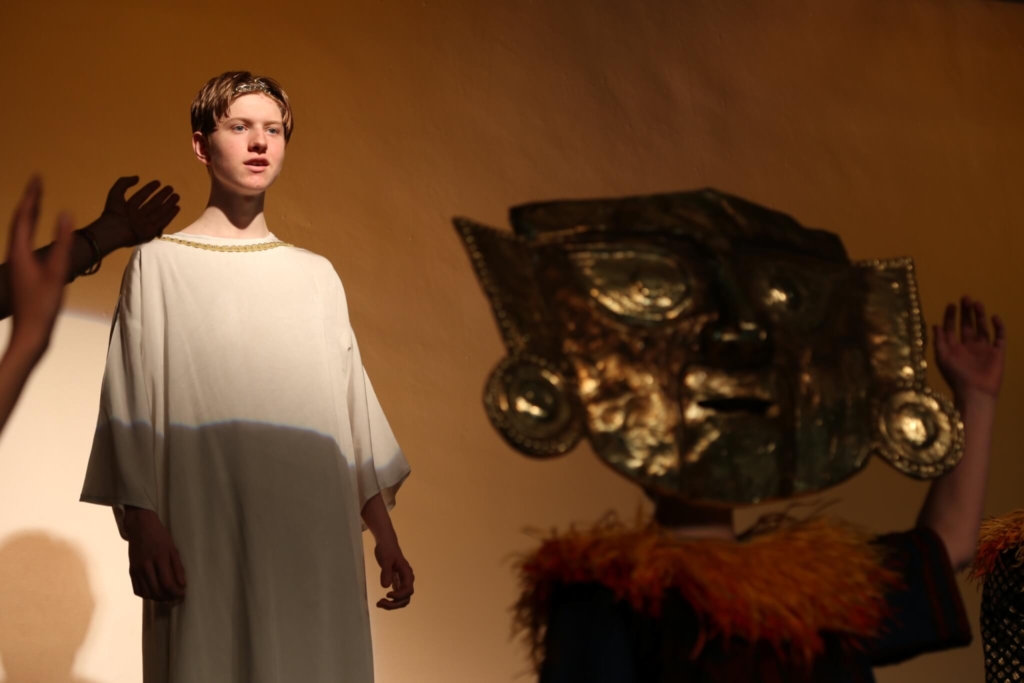Religious Studies and Philosophy
Religious Studies and Philosophy (RSP) is an exploration of some the most important questions of human existence.
‘Why are we here?’, ‘is there a purpose to human life?’, ‘is there a god?’, ‘how should we behave?’, ‘do we have free will?’, ‘how should societies organise themselves?’, ‘is the world really as I perceive it?’ – these are just a few.
Year 7, Year 8 and Year 9 | core subject
We explore the above questions through studying the six major world religions and non-religious philosophical perspectives. Students will also gain a good understanding of the key beliefs and practices of the great world faiths.
In the Summer Term of each year students take part in Philosophy for Children where in group enquiries they develop their critical thinking, debating and self-expression skills while considering such ‘big’ questions listed at the outset.
Year 10 and 11, GCSE | option subject
The Religious Studies GCSE is more than its name suggests. Pupils study a range of religious beliefs, especially Christian and Islamic, coming to recognise that religion remains one of the most powerful influences on our world today. They also examine a range of philosophical and ethical perspectives,
considering issues around medical ethics, crime and punishment, war and violence and the philosophy of religion as well as questions such as ‘does God exist’ and ‘how can there be a loving God with all the evil in the world?’. Not only is this an academic study, but Religious Studies GCSE can be a journey of personal development. Philosophical and religious beliefs shape everything about an individual; how we view ourselves and others, the purpose of life and what happens at its end, along with the formation of attitudes to key moral issues and the development of our own decision making.
GCSE REQUIREMENTS
– There are no specific academic requirements.
EXAMINATION BOARD
– AQA GCSE 8062 Religious Studies
Sixth Form, A-Level | option subject
Philosophy is literally ‘the love of ideas’. This subject is ideal for students who enjoy wrestling with big questions that often don’t have answers, such as ‘Is the world really as it appears to us?’, ‘Are we born knowing anything?’, ‘How do we make moral decisions?’, ‘Is it acceptable to lie under certain circumstances?’, ‘Is the mind the same thing as the brain?’, and ‘Does God exist?’.
We explore answers suggested by some of the greatest minds in history. So, not only will studying Philosophy enlarge a student’s understanding of their own existence, it will also demonstrate to universities and employers the quality of their mind, showcasing the highly prized skills of constructing arguments, thinking logically and creatively and communicating ideas clearly.
A-LEVEL REQUIREMENTS
– Students do not need to have studied (I)GCSE Religious Studies and Philosophy. However, it is expected that students will have at least a grade 7 in either (I)GCSE History, English Language or English Literature.
EXAMINATION BOARD
– AQA A-Level 7172 Philosophy
John Lyon Success
– 60% of A-Level students achieved A*-B grades in Philosophy.
– 58% of GCSE pupils were awarded a 9 or 8 grade in Religious Studies.
– Nathan Cuttica (OL2019) left John Lyon to read Philosophy at the University of St Andrews.
Outside the Classroom
John Lyon’s programme of extra-curricular activities includes a number of options directly related to or complementary to Religious Studies and Philosophy, such as Ethics, Faith Club and Philosophy Club.
Beyond School
Religious Studies develops analytical and critical thinking skills, literacy skills, the ability to work with abstract ideas, leadership and research skills. As such, it is a highly respected academic qualification, with all universities welcoming pupils with Religious Studies onto their degree courses.
Former pupils have progressed to read Law, Medicine, Philosophy, Economics, English, and many other subjects, finding careers in the legal profession, business world, financial services, health sector, media, civil service, teaching and numerous other professions.
A-Level Philosophy is a highly respected academic qualification. Past students have gone on to read Philosophy, Theology, Religious Studies, PPE, Law, Medicine, Dentistry, Economics, English and many other subjects at Oxbridge and Russell Group universities. According to the Association of Graduate Careers Advisory Services, Philosophy graduates go into a wide range of careers including: law, medicine, psychology, education, politics, business and financial services, the civil service, journalism, publishing, broadcasting, advertising, film and media.

























































 We provide a wide range of sporting activities and opportunities for all pupils.
We provide a wide range of sporting activities and opportunities for all pupils. At our Prep School we concur with educational theorists who emphasise the importance of the creative mind and ‘emotional intelligence’ and ‘wellbeing’ – the need to develop the whole personality and our pupil’s imaginations especially. Drama has the power to liberate the mind.
At our Prep School we concur with educational theorists who emphasise the importance of the creative mind and ‘emotional intelligence’ and ‘wellbeing’ – the need to develop the whole personality and our pupil’s imaginations especially. Drama has the power to liberate the mind. We encourage our pupils to become healthy, independent and responsible members of society.
We encourage our pupils to become healthy, independent and responsible members of society.  At our Prep School, Computing covers the use of electronic technology in all its forms, including computers and other communication devices.
At our Prep School, Computing covers the use of electronic technology in all its forms, including computers and other communication devices. • What is religion?
• What is religion?
 Art is an integral part of our Prep School’s curriculum, providing our pupils with a unique means of expressing their ideas by allowing them to explore new thoughts and give life to their creative minds.
Art is an integral part of our Prep School’s curriculum, providing our pupils with a unique means of expressing their ideas by allowing them to explore new thoughts and give life to their creative minds. History is taught throughout the School and pupils are encouraged to find out about events and peoples.
History is taught throughout the School and pupils are encouraged to find out about events and peoples. Planet Earth is our only home. It is an mind-blowing, diverse and constantly changing place of awesome beauty and power.
Planet Earth is our only home. It is an mind-blowing, diverse and constantly changing place of awesome beauty and power.  French is the language of our nearest neighbours, probably the easiest foreign language for English speakers to learn and, after English, one of the most widely-learned languages worldwide.
French is the language of our nearest neighbours, probably the easiest foreign language for English speakers to learn and, after English, one of the most widely-learned languages worldwide. The core of every science lesson at our Prep School is about developing every pupil’s curiosity in the world around them.
The core of every science lesson at our Prep School is about developing every pupil’s curiosity in the world around them.  Mathematics is a key subject for children of all ages at our Prep School.
Mathematics is a key subject for children of all ages at our Prep School. English is taught using lively and creative methods through a variety of texts and resources incorporating ICT from Pre-Prep onwards.
English is taught using lively and creative methods through a variety of texts and resources incorporating ICT from Pre-Prep onwards.